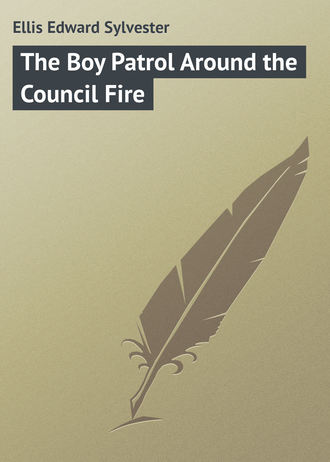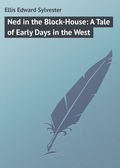
Ellis Edward Sylvester
The Boy Patrol Around the Council Fire
CHAPTER XIX – The Final Test
“Mr. George Burton may think he has a mighty smart dog,” reflected Hoke Butler, as he picked his way up the small stream, “and he isn’t any slouch, but there are some things he can’t do, and one of them is to follow a fellow’s trail through the water. Funny that when Burton shut us off from the lake he forgot this brook. Since he didn’t mention it, I have the right to use it.
“Now,” continued the logical young man, “while I keep to the water I don’t leave any scent; I’m like the fawn which the hound can’t track through the woods, and when Zip comes to the point where I stepped into the water, he’ll be up against it – hello!”
He had come to a place where the brook expanded into a pool and more than fifty feet across. Opposite to where he halted, the foaming current tumbled over a series of boulders, and then spread out into the calm expanse, whose outlet was the small stream which Hoke had ascended to this point. The water lost a good deal of its limpidity, so that the bottom could be traced only a little way from where he stood.
“That’s bully!” exclaimed the Scout, after brief reflection; “I’ll walk across the pond – it can’t be deep – and step ashore on the other side, Zip won’t come within a mile of the spot.”
He began wading, cautiously feeling each step before advancing. Since the depth was unknown he could not be too careful, though confident that the little lake was shallow in every part.
Half across the icy water reached to his knees. He pressed slowly on, thrusting out a foot and making sure of a firm support.
“It ought now to grow more shallow,” he reflected as he felt his way forward; “when I get to shore I may as well go back to the bungalow and wait till Zip returns disgusted. I guess Burton can take a joke when it’s on him, and he’ll laugh with the rest of us – ”
At that instant, Hoke stepped into an unseen hole and dropped out of sight. The sudden clasp of the icy element made him gasp, and when his head popped up, he spat and struck out frantically for land. It was remarkable that the only spot in the pond where the water was over his head was barely two yards across, and beyond it the depth was so slight that while swimming, one of Hoke’s feet struck bottom. He straightened up, and strode to land, shivering in his dripping garments.
“Who’d have thought that? I didn’t dream of anything of the kind – where did you come from?”
This angry question was addressed to Zip, who thrust his muzzle against Hoke’s knee, looked up and wagged his tail.
“I’d like to know what led you here, when you hadn’t any scent to follow.”
“It was his nose,” remarked young Burton some time later, when Hoke having exchanged his wet clothing told his story to the laughing group on the piazza.
“I left no scent when I stepped into the brook,” replied Hoke.
“Therefore he knew you were in the brook; and set out to find where you had left it.”
“He had to follow both sides in turn.”
“Not at all; from one bank he could detect, without the least difficulty, the scent on the other side. He failed to take it up, and therefore knew you had still kept to the stream. If you had not been in sight when he reached the pond, he would have circled around it and nothing could have prevented his discovering your trail within the next few minutes. But he saw you feeling your way across, and the direction in which your face was turned told him where you would come out, – so he trotted around to welcome you when you reached land.”
“Why didn’t he jump in to help me out of the hole?”
“The bloodhound is content to leave that kind of work to his brother the Newfoundland, and a few others. You are ready to admit, Hoke, that there are bigger fools than Zip.”
“Yes, – and here sits one of them. Mike doesn’t seem to care to match with him.”
“There’s where you’re mistook, as Bridget Lanigan said whin she picked up a red hot poker thinking it was a ribbon she had dropped from her hair. Come, boys.”
Mike sprang from his seat and addressed Alvin and Chester. There was much chaffing as the three passed into the bungalow and out at the rear. Zip had taken his place beside his master’s chair, where he sat with his long tongue hanging far out, his mouth wide open, and his big ears dangling below his massive jaws. He manifested no further interest in what was going on around him, though he must have understood everything.
The agreement with Mike was that the dog should remain on the piazza with his master and the other scouts until a full hour should have passed. Then he was to be allowed to smell of a pair of shoes which the fugitive left behind him. These belonged to Alvin Landon, who had brought some extra footgear. They had been worn by Mike for several days when he replaced them with his own, which he had on at the time he left the bungalow. Thus far everything was plain and above board.
“I don’t know what Mike has up his sleeve,” remarked young Burton; “no doubt it is something ingenious, for he and his two chums have been whispering and chuckling a good deal together, but Zip will defeat him as sure as the sun is shining in the sky. You have noticed that my dog does very little baying, – or rather, Isaac and Hoke have noticed it.”
“But he gets there all the same,” laughed Rothstein; “I should like to know what plan Mike has in mind.”
“We shall learn when he comes back and we hear his story.”
Prompt to the minute, Burton directed the attention of Zip to the pair of shoes that had been placed on the ground at the foot of the steps.
“Find him,” was the command of his master, and the hound fairly bounded out of sight around the corner of the building. He bayed once as he picked up the scent, and then vanished like a bolt from a crossbow. The crowd of Boy Scouts resumed their chat and awaited as patiently as they could the issue of the novel test.
Meanwhile, Mike Murphy and his two chums set to work to carry out the scheme which they had formulated, and which each one was confident must result in the humiliation of the wonderful dog and his owner. With abundance of time at their command they did not hasten, but walked with a moderate pace to a point some two hundred yards from the bungalow. They had straggled along side by side, without trying to make their trail hard to follow, and now halted.
“This is far enough,” remarked Alvin, as the three peered around without seeing any one.
His companions agreed. Then Alvin and Mike sat down on the ground and exchanged shoes. Not only that, but the former stooped and the latter mounted his back, his arms loosely around Alvin’s neck with his legs projecting in front and supported by the crooked elbows of his carrier. Then he resumed his walk with Chester trailing behind.
When the distance from the bungalow had been doubled, Alvin asked:
“How much do you weigh, Mike?”
“A hundred and forty-three pounds – when ye started.”
“I think it is about a ton now; how far do you expect me to carry you?”
“Not far, – say two or three miles.”
“I rather guess not; Chest, it’s time you took a turn.”
“Oh, wait awhile; you have only just begun.”
“This isn’t as much fun as I thought,” growled Alvin, resuming the task that was fast becoming onerous.
“I’m enj’ying mesilf, as Jerry Dunn said whin he tackled three p’licemen. When I git tired I’ll sing out, and we’ll make a change.”
Chester’s sense of justice led him soon after to help in shifting Mike to his own shoulders, and the progress was resumed much the same as before.
You will perceive the trick the boys were playing upon the bloodhound. Mike had not only changed shoes with Alvin Landon, but his new ones were not permitted to touch ground while they traveled a fourth of a mile through the unbroken woods. Moreover, for this distance the leaves were trampled by Mike’s shoes, but they were on the feet of Alvin.
The next step in this curious mixup was for Alvin, still wearing Mike’s shoes, to diverge to the left, while Chester, with Mike on his shoulders, went a considerable distance to the right, where he halted and the Irish youth slipped to the ground and stood in the footgear of Alvin, who was so far away that he could not be seen among the trees.
All this was prearranged, as was that which followed. Mike started off alone, aiming to return to the bungalow by a long roundabout course, while the other two came together at a new point, and made their way by a more direct route to where their friends were awaiting them.
“I wonder that Zip doesn’t show up,” said Alvin, when they caught sight of the building, and he looked back; “it is considerably past the hour, and he ought to be in sight.”
“It can’t be he was sharp enough to detect our track.”
“Impossible!”
And yet that is precisely what he did do, and later, when all were gathered on the piazza, including the dog, who arrived less than ten minutes after the astounded Mike, George Burton complacently explained how it had all come about.
“It was an ingenious scheme, Mike, and deserved success, but it did not bother Zip for more than a few minutes. If a dog can smile, he must have grinned when he penetrated your strategy. You made one mistake which was natural.”
“It looks to me as if our greatest mistake was in thinking the pup didn’t know more than ten times all of us together,” said Mike with a sniff.
“That, too, was natural in the circumstances, but when you changed your shoes with Alvin, then was the time you three should have parted company. Instead, you stayed together, and Zip kept to the trail, for it was the only one for him to follow. Had you separated, he probably would have followed Alvin for awhile, but not long. He would have detected the deception, run back to the point of separation and hit the right one.”
“But he virtually did that afterward,” remarked Scout Master Hall.
“A proof of the truth of what I said. No doubt Zip trailed Alvin for a little way or until he discovered that the scent had changed and he was on the wrong track. Then he turned back and hunted out the right one.”
“If that explanation is correct,” said the amazed Mr. Hall, “it proves that the bloodhound was able to detect the emanations, or whatever it was that exhaled from Alvin’s feet, and could be differentiated from Mike’s even though it must have passed through the leather worn for days by Mike.”
“Unbelievable as it sounds we have to admit it, but,” added Burton, “we mustn’t lose sight of what doubtless was a contributing factor. It was not Mike’s shoes alone that told the secret, but his clothes. He brushed the trees and limbs when carried on the backs of his friends, and while walking. It was that which was probably the surest clue to Zip, as it was with Isaac and Hoke, and made it impossible for any one of the three to mislead the dog.”
CHAPTER XX – Speed the Parting Guest
George Burton and his dog Zip had won golden opinions from the Boy Scouts, who urged their visitor to spend several days with them, but he declined, saying he would set out on his return to Mouse Island directly after dinner, which was eaten at one o’clock. Truth to tell his tastes differed from those of his new friends. He cared little or nothing for bird lore, or the study of trees, or roughing it in the woods. But he was an athlete, who could outrun any one of the Boy Scouts and last longer on a tramp. He was putting himself through a course of training, with a view of making the football team when he should enter Princeton University, for which he had already matriculated. His sole companion on his long runs or the hours devoted to hardening his muscles was Zip, between whom and himself, as had been shown, there was a strong affection.
Accordingly, while the afternoon was quite young, Burton shook hands with all his friends, promising soon to see them again, and stepped into one of the canoes moored in front of the bungalow. He sat on the bottom with Zip between his knees, while Alvin Landon and Chester Haynes manipulated the paddles. Mike Murphy sat in front of Burton and assumed the airs of a captain. Burton had intended to pass around the eastern end of the lake, and over the rough trace to the highway, and so on to Boothbay and Mouse Island, thus reversing this tramp of the day before. Considerable of this long course could be saved by using the boat.
“I don’t see how you can reach Mouse Island before night,” remarked Alvin as he slowly swung his paddle.
“I can’t.”
“Then why not stay with us and make your start in the morning?”
“What’s the difference? The weather is clear and cool, and the moon is near its full. I can reach Boothbay Harbor some time in the evening and stay there over night, and hire a launch to take me to Mouse. Or if I feel lazy, I can find accommodations at Bovil, which you know is a little village between that frightful road over which your supply team labors and Boothbay. Zip and I don’t mind a little thing like that.”
“Hello!” exclaimed Chester, “are we never to be rid of those pests?”
On the shore of the lake to their right, two men were seen standing with their attention fixed upon the canoe and its occupants. The distance was so slight that the three boys instantly recognized them as their old acquaintances, – Buzby Biggs and Saxy Hutt. It would have been thought that after their recent experience they would have lost no time in getting out of the neighborhood, but it will be remembered that when they leaped in a panic from the wagon of our old friend Jake, instead of running away from Gosling Lake, they headed toward it.
Zip was quick to identify the vagrants. Looking toward them he emitted a throaty growl.
“He hates tramps so, that I have to restrain him when we meet them.”
“And why do ye reshtrain him?” asked Mike from his place in the boat. “Why don’t ye gratify his appetite for such spalpeens, though I’m thinking he runs risk of being p’isoned?”
“So long as the tramps keep out of mischief I am willing to leave them alone.”
“But that is what they don’t do; they seem to have a spite against Doctor Spellman and his family.”
“Against Doctor Spellman!” exclaimed Burton; “you don’t mean Doctor Wilson Spellman?”
“That’s his name.”
“Where is he?”
Alvin lifted his paddle and pointed a little away ahead and to the right.
“He has put up one of those patent houses among the trees, where you can’t see it from the lake, though we observe the smoke from his fire now and then. There he and his wife and little girl Ruth are spending several weeks in the most sensible manner possible.”
“Why, he’s my uncle,” added the surprised and delighted Burton; “I knew he had gone on an outing in Maine, but thought it was at the Rangely Lakes. Now, as the expression goes, isn’t that ‘funny’?”
“You will like to call on him?”
“Most certainly; I’m very fond of him, and of Aunt Susie and Ruth.”
The boat was sheered toward land at a point where the canoe of the physician was seen drawn up the bank. The two tramps stood so motionless and fixed in their attention that they suggested a couple of scarecrows. Mike turned his head and grinned.
“Head the boat toward them, as if ye intinded to call and lave yer cards.”
The bow was whirled further around, and pointed straight for the vagrants. Zip was tremulous with eager expectation. Resting his paws on the gunwales, he twitched his ears and growled. One good look at the canine was enough for the men. They turned about and dived among the trees as terrified as when the bullets of Doctor Spellman’s revolver whistled about their ears.
“Howld on!” shouted Mike, “till we can talk politics wid ye, and thry to agraa as to whether the Bool Moose ought to be the next President.”
But the scamps paid no heed, and Mike looked commiserately at the dog.
“’Tis a cruelty thus to disappint ye, Zip, as me dad said whin he walked five miles to have a shindy with Terence Googhagan, and found he’d been drowned; but ye may git a chance at ’im later on.”
A few minutes afterward the nose of the canoe slid up the bank, and the boys stepped out. It being early in the afternoon, Doctor Spellman was seated in his camp chair in front of his house, smoking a cigar and looking over the Boston Globe. His wife, having set things to rights, had come forward to join him, with Ruth directly behind her.
The meeting was a pleasing one. When Burton remarked that he had time for only a call, the doctor and his family put so emphatic a veto upon it, that he was obliged to yield and agreed to remain until morning.
After mutual inquiries and answers had been made, Burton told of the forenoon’s test of Zip’s marvelous power of scent. The story was so remarkable that even Sunbeam, as she sat on Burton’s knee, silently listened. The two were old friends. The little girl was the only one besides his master whom the hound would allow to become familiar with him.
“I wish I had a dog like him,” remarked the doctor.
“That is impossible, for there isn’t another like him,” replied the owner.
“I have been so annoyed by a couple of tramps that I should like to get Zip on their track and have him drive them out of the neighborhood.”
Alvin and Chester had told the guest of the doings of the nuisances, and there was laughter at their panic when, looking over the side of the canoe, they saw the frightful head of the sea serpent, apparently in the act of rising up to crush the boat or them in its jaws.
“I can’t understand why they persist in staying in these parts, after the hints they have received,” said the doctor.
“Can they have any special design in view?” asked Burton.
“I have thought of that, but can’t imagine what it is. All such pests are thieves, but that is the worst that can be said of them. There is nothing in my home that is specially tempting; they know I have a gun and a revolver, – and that I am quite ready to use it if they give good cause. Yet when I kill a man,” added the doctor with a grim smile, “I prefer to put him out of the way in my professional capacity. There are no unpleasant consequences to myself.”
“Couldn’t one of the spalpeens be ill?” suggested Mike. “He may be trying to screw up his courage to the p’int of asking ye for a prescription.”
“He will find me ready, and I’ll charge him no fee.”
At this moment, the physician supplemented his words by a remark which, in the light of after events, was singular to the last degree.
“George, I have arranged a system of signals with my young friends here.”
“I don’t catch your meaning.”
“When young Jack Crandall broke his leg some time ago, there was no telling what complications would follow. It was therefore agreed that in case I was needed in a hurry, some of the Boy Scouts should fire one of their revolvers several times in quick succession. Then I would paddle to the bungalow as fast as I could.”
“Could you count upon hearing the reports?”
“Yes, – as a rule; there is nothing to obstruct the sound on the water, unless it might be a strong wind, and as to that we shall have to take chances. My signal may vary.”
“Your signal,” repeated the astonished nephew; “what need can you have for anything of the kind?”
“Probably not any, and yet there’s no certainty that I shall not. I brought some fireworks for the amusement of Stubby. Among them are a dozen sky rockets. If we should find ourselves in need of help at night, three rockets sent up in the sky will notify the Boy Scouts, who I know will make all haste hither, and a score of such young fellows form a force that even a half dozen men dare not despise. If I need them after they have retired I can use my rifle or revolver the same as they would use their weapon.”
“Suppose the emergency should happen in the daytime?”
“We have our firearms to appeal to; with them we can duplicate the call of the Boy Scouts.”
“I suppose the system is the best that can be devised,” said Burton, “and yet it strikes me it is as likely to fail as to succeed.”
“Why?”
“For your rockets to serve, some of the boys must see them, – and what certainty is there that they will do so?”
“Of course there’s the possibility that they may not, – but until Scout Master Hall and his charges retire for the night, all or a majority of them are on the piazza and some of them would be certain to observe the rockets as they streamed upward, leaving a trail of fire behind them.”
“But why talk of your needing our help?” asked Alvin; “it strikes me as absurd, though the reverse of the rule is sensible.”
“I may as well confess that I feel uneasy over the persistent hovering of those tramps in the neighborhood. I fear to leave wife or Ruth alone, and I never do so even for a short time without making sure my revolver is loaded and at her instant command.”
“When you come to the bungalow, you can bring Sunbeam and her mother with you,” said Chester Haynes, “as you have generally done.”
“That is my rule, but it leaves the house without the slightest protection, and those tramps, if they wish, can work their own sweet will.”
“You did not visit us to-day, doctor.”
“Crandall is getting on so well there’s no need; he moves about so readily on those crutches you fellows presented him that his rapid recovery is assured. If to-morrow is fair, you may expect us over to dinner.”
Alvin and Chester felt that this visit really belonged to young Burton, – so, after remaining a brief while longer, the three bade them all good-bye and paddled back to the bungalow, which they reached in the latter part of the afternoon.







